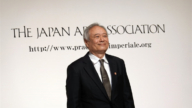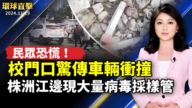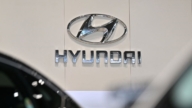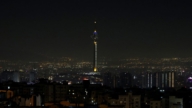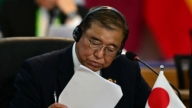【新唐人2011年12月5日讯】美国国务卿希拉里.克林顿日前对缅甸的历史性访问,被认为是美国对缅甸政府实施民主变革的“回报”。美国与缅甸关系升温,挑起了中共紧张的神经,《环球时报》发文声称,希拉里访缅期间的言论是在挑拨缅中关系。文章遭到了网友们的驳斥,有学者则认为,这反映出中共对缅甸民主进程的影响感到恐惧。
希拉里在访缅期间,与缅甸总统吴登盛举行了会谈,并两次会晤了反对派领导人昂山素季。她赞扬了缅甸领导人近期的举措,并承诺将对缅甸政府的民主改革给以回报,努力开启两国关系的“新篇章”。
中共喉舌《人民日报》旗下的《环球时报》12月2号对此发表社论说,希拉里挑拨缅中关系,有失风度。
社论引述了希拉里的一些发言,如“发展中国家要做一个聪明的受援国”,“警惕那些只对挖掘你们的资源更感兴趣的援助国,它们不会想着去构建你们的能力”等。
不过民众对社论似乎并不买账,有网友对《环球时报》观点和逻辑一一进行了驳斥。
网友村主发表文章点评说,送鱼给人,不如干脆把捕鱼的方法传授给人家,才能从根本上解决问题,把民富国强的体制传授给人家,才是真心希望人家好,希拉里说得不对吗?
《环球时报》还说,“世界媒体无一例外的”认为,希拉里的讲话是冲着中国来的。作为美国的国务卿,靠说“坏话”来抵毁中国,表现出其“小肚鸡肠”。
村主则驳斥,《环球时报》的社评,反倒反映出中共“小肚鸡肠”。希拉里既没点中国的名,而且,“世界所有媒体”都不幸又被《环球时报》代表了一回。
有学者认为,《环球时报》的社论,恰恰显示出缅甸民主进程发展促成美缅关系的升温,令中共感到紧张和不安。
香港《开放》杂志执行编辑蔡咏梅认为,鉴于缅中两国存在的地缘政治关系,缅甸目前进行的民主变革对中国的冲击作用,会超过中东茉莉花革命。
蔡咏梅:“现在中国大陆都在关注缅甸的局势发展。我觉得这个影响和冲击是非常非常大的,民主浪潮一来就谁都不能抵御。以前认为很封闭的一些国家,现在开始,比如缅甸现在已经开始出现(民主变革)。”
“卡内基国际和平基金会”亚洲负责人包道格认为,由于中共对缅甸巨大的影响和干预,这个一年前还在国际上孤立的国家,现在在寻找一个针对她巨大邻国的平衡力量。
美国智库“威尔逊中心”亚洲问题专家维克费尔德表示,缅甸并不是唯一小心“与中共保持距离”的国家,其他东南亚国家也试图在美国的保护伞下抵制中共施加的影响。
对于缅甸是否会在中国和美国之间做出选择,昂山素季在今年5月曾经说:“如果我不得不站在某一边的话,我选择站在人权这一边,因为人权属于全世界所有的人。中国是缅甸的邻居,我们与中国的关系将是一个特殊的邻国关系,而我们与一直试图帮助我们实现民主的西方国家的关系将是一种不同的关系,一个基于民主这个共同价值的友谊关系。”
新唐人记者李明飞、王明宇综合报导。
Clinton’s Landmark Visit to Burma Upsets CCP
U.S. Secretary of State Hilary Clinton’s recent landmark visit
to Burma is seen as a “reward” to the Burmese government for its democratic reforms.
The Chinese Communist Party (CCP) is wary of warming ties
between the United States and Burma
An article in China’s Global Times claimed that Clinton’s
Speech in Burma was designed to sow discord between Burma and China.
The article was criticized by netizens, while some scholars
believed that it reflected the CCP’s fear of democracy taking hold in Burma.
Clinton talked to the president of Burma, Thein Sein,
and met with opposition leader, Aung San Suu Kyi, twice.
Clinton praised the Burmese government’s progress
and promised to reward Burma for
its democratic reforms by turning a new page in
its bilateral ties.
The Global Times, which is connected to the CCP’s mouthpiece,
the People’s Daily, published an editorial on December 2,
saying that Clinton’s provocative speech
on the relationship between Burma and China was undignified.
The editorial cited some parts of Clinton’s speech, such as
“a developing country should behave as a clever recipient country,"
and “Be alert to those donor countries which are only interested
in your resources, rather than your capacity to develop."
However, the public didn’t seem to buy the Global Times’
editorial with some netizens refuting the logic of every argument it presented.
A netizen named, Cunzhu, wrote an article saying that only
by teaching a man to fish can his problems of food be solved.
It is better than giving him a fish everyday.
Isn’t it right for Clinton to teach Burma how to develop the
country and help them develop faster?
The Global Times said that “all the media around the world"
believes that Clinton’s speech was aimed at China.
It said that as U.S. secretary of state, to speak ill of China
is narrow-minded.
However, Cunzhu said that the Global Times’editorial
reflected the CCP’s narrow-mindedness.
Clinton did not specify China, but the Global Times claimed that
“all the media around the world” knew what she was referring to.
Some scholars believe that the Global Times’ editorial showed
the CCP’s fear of the closer ties between the United States and Burma
because of Burma’s progress on democratic reform.
The executive editor of Hong Kong’s Open Magazine,
Cai Yongmei, said that considering the relationship between
China and Burma, the current democratic reforms in Burma
will impact China more than the Jasmine Revolution did in the Middle East.
Cai Yongmei: “All Chinese people are closely following
the developments in Burma.
I believe the impact will be huge and the wave of democracy
cannot be held back once it arrives.
Some historically repressive countries like Burma
are able to make democratic reforms."
The head of the Asia Division of the Carnegie Endowment for
International Peace believes that Burma,
which is an isolated country,
faced the CCP’s influence and interference one year ago.
It is now seeking a way to balance its influential neighbor.
Bryce Wakefield, an Asia program associate at the Woodrow
Wilson International Center for Scholars, a U.S. think-tank,
believes that Burma is not the only country which “cautiously
keeps its distance from the CCP,"
other countries in Southeast Asia are trying to resist the CCP
under America’s protective umbrella.
As to whether Burma will choose between the U.S. or China,
Aung San Suu Kyi said in May: “If we have to choose a side,
I vote for human rights,
which belong to all the people around the world.
China is our neighbor and there will be a special relationship
between China and us.
But the relationship between Burma and the Western countries
which helped us realize democracy is different.
It’s a friendship based on the common values of democracy."
NTD reporter Li Mingfei and Wang Mingyu.


